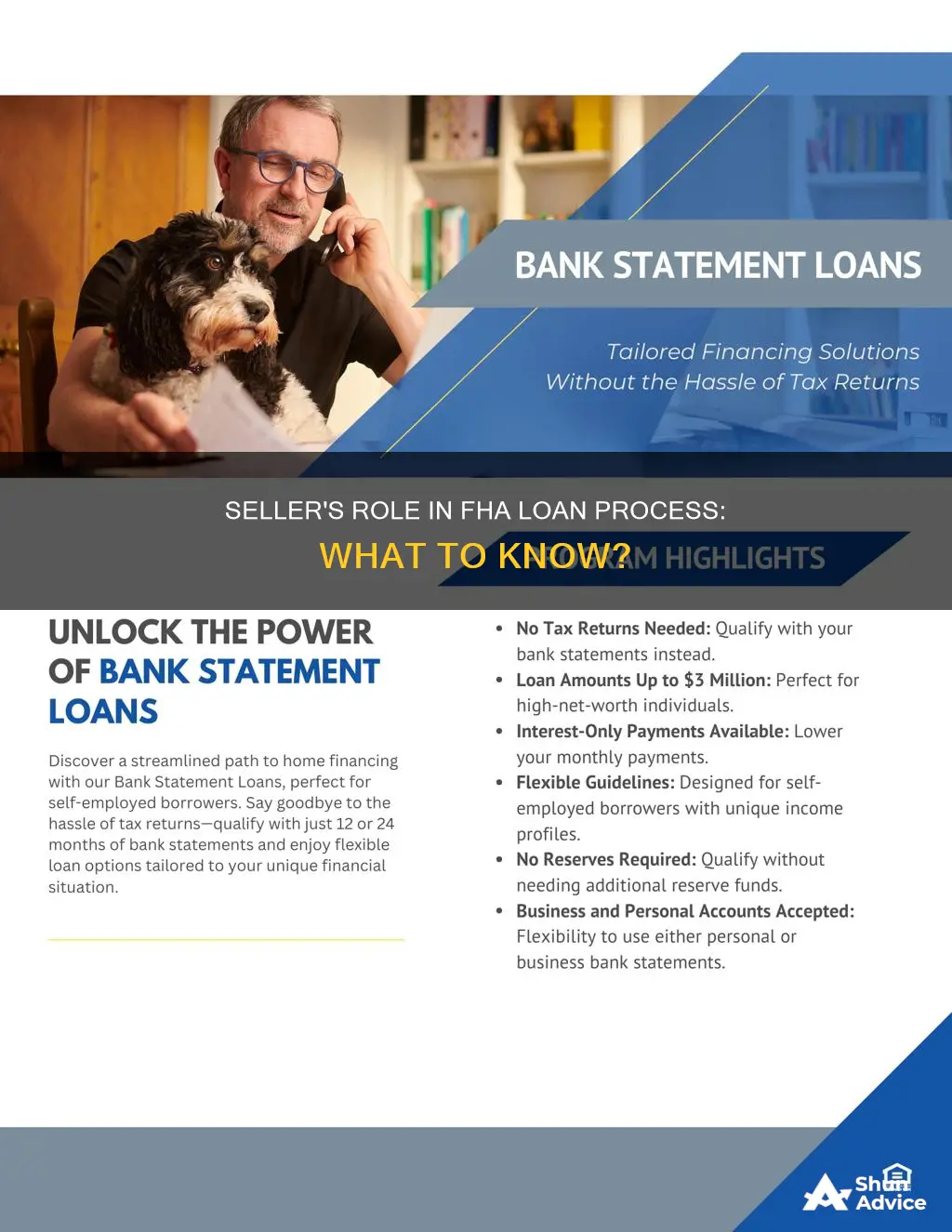
FHA loans are a common financing option for buyers, particularly for houses in the $100,000-$300,000 price range. They are government-backed mortgages designed to make homeownership accessible to first-time or low- to moderate-income buyers. While sellers are free to choose whichever offer they like, they need to be aware of the specific property and financial requirements that must be met for the buyer's loan to close. This includes a more extensive appraisal process to ensure the property meets FHA safety and security standards, which may require costly repairs.
| Characteristics | Values |
|---|---|
| Can sellers refuse an FHA loan offer? | Yes, sellers are generally free to choose whichever offer they like best and they don’t legally have to accept or even consider any offers, FHA or otherwise. |
| Why might sellers refuse an FHA loan offer? | Sellers often perceive the FHA loan approval process as risky because of the FHA’s relatively lenient financial requirements and stricter appraisal and property standards. |
| What are the appraisal standards for FHA loans? | The appraisal standards for FHA loans are set forth by the Department of Housing and Urban Development (HUD) and are more rigorous than the appraisal standards for a conventional mortgage. |
| What are the Minimum Property Standards (MPS) for FHA loans? | The MPS for FHA loans include requirements such as no peeling paint on the exterior of the home and safe access points to all areas of the home. |
| What happens if the property does not appraise at the expected value? | If the property does not appraise at the expected value, the seller may need to lower their price or the deal may fall through. |
| Can the seller pay for repairs instead of lowering the price? | Yes, the seller can pay for repairs to meet the MPS requirements, but these repairs must be completed before the sale of the home and a simple seller concession is not enough. |
| What is the "90-day rule" for FHA loans? | The "90-day rule" states that an FHA loan cannot be originated if the prior owner has owned the property for less than 90 days. |
| What is the minimum down payment for an FHA loan? | The minimum down payment for an FHA loan is 3.5%. |
| Can the buyer ask the seller to cover closing costs? | Yes, the buyer can ask the seller to cover up to 6% of the sales price in closing costs. |
What You'll Learn

FHA loans are insured by the Federal Housing Administration
The FHA was created in 1934 during the Great Depression to reduce the risk to lenders and make it easier for borrowers to qualify for home loans. At that time, default and foreclosure rates had skyrocketed, and mortgage terms were impossible for ordinary wage earners to meet. The FHA loan program was designed to help low- to moderate-income families attain homeownership, particularly first-time homebuyers, and those who might find it difficult to obtain loans otherwise.
FHA loans have more lenient qualification criteria than conventional loans. To qualify for an FHA loan, borrowers need a minimum credit score of 500 for down payments of at least 10%, and 580 for a down payment from 3.5% to 10%. The down payment can be as low as 3.5% of the purchase price, and the property can include single-family houses, mobile homes, and factory-built housing.
FHA loans also require borrowers to purchase mortgage insurance, with the premium payments going to the FHA. This is in addition to the regular mortgage payments, property taxes, and homeowners' insurance premiums. The mortgage insurance premiums consist of an upfront payment and a monthly payment.
When a seller accepts an offer financed by an FHA loan, they agree to meet a set of standards that conventional lenders don't always require. The FHA loan process includes a more extensive appraisal process to ensure that the house meets the FHA's minimum property standards for safety, security, and soundness. The appraisal is conducted by an FHA-approved appraiser following HUD's designated guidelines.
Military Loan Forgiveness: College Dreams, Reality?
You may want to see also

FHA loans are designed to make homeownership more accessible
The FHA loan process aims to ensure that the house a buyer wants to purchase will be a livable, safe, and healthy home. To that end, the FHA has specific property and financial requirements that sellers must meet for the buyer's loan to be approved. The property must undergo a rigorous appraisal process by an FHA-approved appraiser to ensure it meets the HUD's minimum property standards for safety, security, and soundness. This includes verifying that all systems in the home, such as electrical, HVAC, plumbing, water supply, and wastewater removal, are in working order.
FHA loans have more lenient credit score and down payment requirements compared to conventional loans. For example, an FHA loan requires a minimum credit score of 500, whereas a conventional mortgage typically requires a score of at least 620. The minimum down payment for an FHA loan is 3.5% for credit scores of 580 and higher, while conventional loans often require a minimum of 5%. FHA loans also offer flexible mortgage insurance options, allowing buyers to include the costs of energy improvements in their loan.
Additionally, FHA loans provide multiple loan programs to suit different needs. They offer loans for those who own the land their home is on and those who have or will have a mobile home in a mobile home park. There is also an FHA Reverse Mortgage program for homeowners aged 62 and above, allowing them to convert their home equity into cash while retaining the home's title.
While FHA loans make homeownership more accessible, it's important to note that sellers are not obligated to accept any specific type of loan. In a competitive market, sellers may prefer offers without the additional requirements and appraisal process associated with FHA loans. However, in multiple offer situations, an FHA loan-backed offer can still be the most attractive due to its strength in price and contract terms.
Missing Documents: Nelnet Loans and National Collegiate's Impact
You may want to see also

Sellers can refuse FHA loans
Sellers can refuse to accept FHA loans, even if the offer matches or exceeds the asking price. While sellers must comply with equal opportunity housing laws and cannot discriminate against buyers on the basis of race, religion, gender identity, sexual orientation, familial status, national origin, or disability, they are generally free to choose the offer that is the most profitable and convenient for them.
FHA loans are insured by the Federal Housing Administration (FHA) and are a dependable form of mortgage financing. They are often used by first-time homebuyers or buyers with less-than-perfect credit, as they have lower down payment requirements (as low as 3.5%) and more relaxed credit requirements. However, some sellers perceive FHA loans as riskier than conventional loans due to their stricter appraisal requirements and more lenient financial requirements for borrowers.
The appraisal process for FHA loans is more extensive and rigorous than for conventional mortgages. The property must be appraised by an FHA-approved appraiser to meet the Department of Housing and Urban Development's (HUD) minimum property standards for safety, security, and soundness. This includes resolving any issues with systems in the home, such as electrical, HVAC, plumbing, water supply, and wastewater removal. Repairs required by the FHA's Minimum Property Standards (MPS) can be costly for sellers, and there may be concerns about the deal falling through during the underwriting process.
In a competitive seller's market, sellers may have multiple offers to choose from, including all-cash offers, and they may prefer to avoid the perceived complexities of the FHA loan process. However, it is important to note that buyers with FHA loans have a closing rate that is comparable to that of conventional borrowers. Additionally, an FHA-backed offer may be the best offer in a multiple-offer situation if it has a higher price and more desirable terms.
While sellers have the right to refuse FHA loans, buyers can try to address the seller's concerns and find a solution that works for both parties. For example, buyers can agree to an "as is" appraisal or request less in seller contributions to closing costs. It is also essential to understand that the FHA has streamlined the paperwork process, making it more efficient for sellers.
Understanding the Paycheck Protection Loan Repayment System
You may want to see also

FHA loans require a thorough appraisal process
FHA loans are government-insured loans backed by the Federal Housing Administration (FHA) that are designed to make homeownership more accessible to first-time or low- to moderate-income buyers. They are a common financing option, particularly for houses in the $100,000-$300,000 price range.
When a seller accepts an offer financed by an FHA loan, they agree to meet a set of standards that conventional lenders might not prioritise. The FHA loan process aims to ensure that the house is safe, livable, and healthy for the buyer. As such, FHA loans require a thorough appraisal process to determine the loan-to-value ratio (LTV) and ensure the property meets basic safety standards and is worth the investment.
The appraisal is conducted by an FHA-approved third-party appraiser, who provides an estimate of the property's market value. This process typically takes several hours and involves a detailed inspection of readily accessible parts of the home, including basic safety inspections of major systems and appliances. The appraiser may also note defective conditions or problems that need correcting, which the seller may need to resolve before the loan can be approved.
The appraisal usually occurs within a few days to a week after the seller accepts the buyer's offer and the mortgage lender is notified. Once the appraisal is complete, the loan must be closed within 180 days. The original appraiser will return to verify any repairs and update the property's value. If the appraiser is unavailable or the process takes longer than 180 days, a new appraisal must be ordered.
While the FHA appraisal process is rigorous, it is a vital part of the transaction when purchasing a house with an FHA loan. It helps protect both the buyer and the lender by ensuring the property is worth the investment and preventing overpayment.
Payroll Protection Loan: What's the Repayment Deal?
You may want to see also

FHA loans can be more of an issue than conventional financing
FHA loans are insured by the Federal Housing Administration and are offered by FHA-approved lenders. They are designed to make homeownership more accessible to first-time or low- to moderate-income homebuyers. While FHA loans have their advantages, they can sometimes be more problematic than conventional financing.
One of the main issues with FHA loans is that they have more stringent appraisal standards than conventional loans. To meet the Department of Housing and Urban Development's (HUD) guidelines, the home must undergo a rigorous appraisal process to ensure it is a safe, livable, and healthy environment. This can be a problem for sellers who may need to resolve any issues affecting the health and safety of the home before the loan is approved. This includes addressing any non-working systems, particularly electrical, HVAC, plumbing, water supply, and wastewater removal issues.
Another challenge with FHA loans is that they have specific property and financial requirements that sellers must meet for the loan to close. For example, the FHA has a "90-day rule," which means a loan cannot be originated if the prior owner has owned the property for less than 90 days. This can cause delays and complications in the selling process.
Furthermore, FHA loans may have additional closing costs that are not required by conventional loans. These additional costs can be a burden for sellers, especially if they are already facing financial constraints.
FHA loans also require all borrowers to pay mortgage insurance, regardless of their down payment amount. In contrast, conventional loans only require private mortgage insurance (PMI) if the down payment is less than 20%. Over time, this can make a conventional loan a more cost-effective option, especially for borrowers with good credit.
Lastly, FHA loans tend to experience refusals in a competitive real estate market. In a seller's market, where there are multiple offers on the table, sellers may be more inclined to accept offers backed by conventional mortgages or even all-cash offers to avoid the additional requirements and potential delays associated with FHA loans.
While FHA loans have their benefits, such as lower down payment requirements and easier qualification criteria, they can also present more issues than conventional financing due to their stricter appraisal standards, specific requirements, additional costs, and potential for refusals in a competitive market.
Understanding Private Loan Disbursement: Who Receives the Funds?
You may want to see also
Frequently asked questions
Yes, a seller can refuse to accept an FHA loan offer, even if the offer matches or exceeds the asking price.
FHA loans can be more of an issue than conventional financing for home sellers because of the FHA's stricter appraisal and property standards. The appraisal process is more extensive and repairs may be required before the loan can be approved.
FHA loans are insured by the Federal Housing Administration, making them a dependable form of mortgage financing. A buyer pre-approved for an FHA loan is just as likely to close their loan as a buyer pre-approved for a conventional loan.
The FHA has a "90-day rule" which states that an FHA loan cannot be originated if the prior owner has owned the property for less than 90 days.
Yes, the seller may be expected to pay for repairs before selling the home. The FHA will expect all problems to be resolved before any money is given to the buyer.







